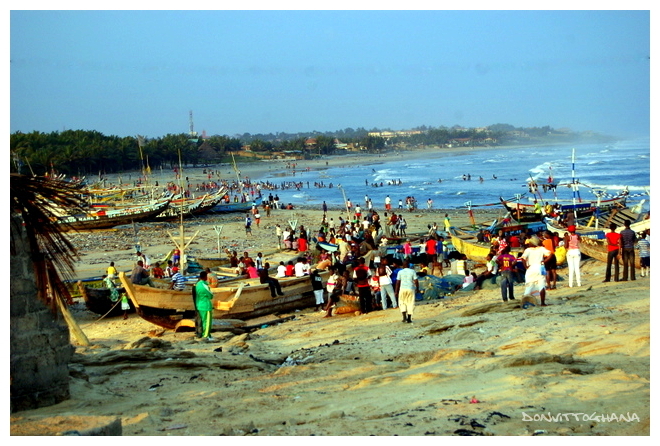Worlali stayed with us for the whole evening and arranged a place to stay. This shows another fact about Ghanaians; Ghanaian people are very, very friendly. They want to help you with anything. If you ask a direction, they will not only point you, but also guide you through the crowd.
At first, we were a little bit anxious to follow a stranger, but after a while we saw that they all are of good will.
They actually want to help you; something we are not used to in The Netherlands.
Where the cocoa industry lacks the free market system, the other branches highly compensate. You are forced to bargain at every spot, if you do not want to be bankrupt within 3 weeks. Whether you are taking a taxi or buying goods on the biggest market of West- Africa, see “Figure 34. Central market in Kumasi” on page <?>. you will need to negotiate about the pricing.
What really works well and is fun at the same time, is try to speak Twi. Twi is one of the local languages in Ghana and is commonly used in Kumasi. If you need a favour of someone and say “Medaasi” instead of “thank you” helps a lot. They notice that you show interest in them and their culture. Being a “Obruni”, which means white person, is quite funny in Ghana. Just walking around in villages will make you feel like you’re a world famous pop singer. Children, and even Elderly, are screaming and shouting “Obruni!!” and do not stop waving and shouting, until you have waved back and said that you are OK.
Another notable Ghanaian mystery is marriage, most taxi drivers are not married and were all interested to marry Evelien. As well as many other Ghanaian men, it mostly helps to tell them that Sjoerd or Selcuk was her husband, because they do not take no for an answer. Those men really believed that marrying a white woman will improve their lives. Not only the men were interested in ‘Obruni’, also the women see future in the white men. They wanted to marry Selcuk and Sjoerd themselves or introduced their daughters. The women think that white men are able to bring them to the ‘better side of world’.
Besides travelling by trotro, which is mini van, is an experience on its own. The driver of this trotro makes it a trip to never forget by putting on a real ghanaian film. The bizarre films about justice and god are almost a little scary, since people get burned alive doing actually nothing wrong. “Figure 35. Ghanaian films” on page <?>, shows a wall full with promotional posters for some film. It gives a good inpression of how extreme this films are.
The above mentioned aspects account for Ghana in general. However, if we zoom in on Farmerline, the functions of Van Alphen can be reviewed as well.
Entrepreneurial activities
Farmerline is booking progress since they have started business. They already have 5.000 small- holder farmers under contract and are in business for more than three years. The first phase is to do research about the cocoa sector. In the second phase, Coocbod and LBCs are approached. This is done together with Albert, who works at Farmerline. He helped us arrange meetings with LBCs. However, contacting the LBCs and making an appointment was not very successful so another approach was executed. We decided to go to those LBCs without having an appointment and see what could be achieved.
This worked rather well, if someone from an LBC suddenly sees three international faces who are interested in their company, they are very willing to talk with you. We used this advantage and spoke to several LBCs. In Ghana it is also helpful if you know someone who can connect you another person. We used our landlord/host father to get in touch with someone from the Control Union of Ghans. This way, you skip all the bureaucratic non-sense and be much more effective in achieving your goal.
Creation of adaptive capacity
As we spoke to those LBCs, we told them about our vision and how weather data could play its role in this. Farmerline speaks at several conferences in Ghana, but also abroad to spread the word. This helps to create this important adaptive capacity of those who are involved.
This form of marketing seems more fruitful than broad marketing on television or on billboards. We spoke to Ghanaians and they told us that marketing is done very differently than in western countries. If you want to approach a certain target group. You should meet them and interact with them face to face, rather than advertise. In our initial business model there was an advertisement on the radio. This has however changed, because of the fact that Farmerline and LBCs we have spoken told us that this is not the most efficient way to target farmers.
